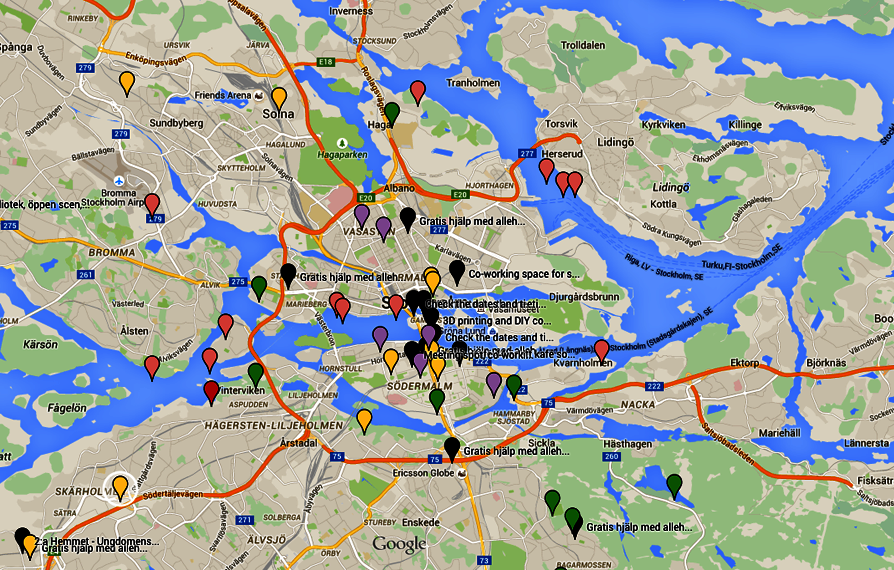How to Share Everything with a Map
These days digital maps support our lives much more than they did in the past, and even more than they did a few years ago. We use digital maps a lot, for navigating in the car using GPS services, and similarly using tools like Google Maps when we are trying to find a place on foot, facilitated by our smartphones. We are able to look up directions using Google Maps, helping us to plan the most effective route from A to B, and also to know how long to allow for the journey and, in the case of car trips, how much traffic there is currently on route (and as we progress along the route this is updated). All of these are very helpful uses of maps. But lately some enterprising folks have been looking at how sharing can be achieved using a map. How can digital maps help the sharing economy?
According to Stina Heikkila (2014) writing for Sharitories, a Swedish “Map Jam” was recently held. The technology used was MapJam, which is a web and mobile map publishing platform that allows businesses, organizations, and people to create useful, personalized maps that are easy to share.This was put together by DelaEko, which is a Swedish blog on collaborative economy of Stockholm and the Kollaborativ Ekonomi Goteborg in Gothenburg. In this case collaborative economy activities were mapped out in these two cities as well as many more. This has brought even more to mapping than people might realise is possible, and the Map Jam facilitated this in more than 80 other cities as well. The goal of the Map Jam was to build the map in a collaborative fashion. Such a task is never finished as new opportunities for sharing continue to grow, and these also need to be added to the map. As explained by Heikkila:
“What if you could pull out your smartphone from your pocket and find a map of your town’s communal gardens where you could go to plant an avocado pit or pick an onion?”
Of course it is not all about vegetable gardening, but you get the idea. The project aimed to map where you can go to share stuff. It is these types of uses of maps that are already available in more than 80 places. Cities that are involved are not just found in Scandinavia, but also in Kenya, Norway, Indonesia and the United States. The following video, done by Shareable gives you an idea how it works:
The goal of Mapjams is to map places where exchange and sharing is possible, such as giving, receiving, borrowing and renting of products and services through the use of the collaborative economy.
Map Jam: sharing maps with other people
One really interesting finding as a result of the Map Jam was the fact that these sharing maps were created in collaboration with other people. It was not just that one person was gathering the information and creating a map for any given city. As DelaEko reportedly saw through the creation of their map, participants had different drivers that led to their collaboration with the project. It could be seen how different perspectives and needs led to the development of the map. For example, they found that while one person was offering free dance lessons and wanted to put this on the map, another was seeking a place to hold homework support sessions.
Overall the process aimed to maintain values of transparency and openness, in line with those embraced in the wider collaborative movement. This means that it is possible for anyone to open any map and to go ahead and add new points to that map. This leads to a common sharing map that is built up from the basis of shared knowledge, which becomes collective knowledge of the local area.
It seems possible that Map Jams may become annual events. They require the dedication of a small group of people from the community that have knowledge of the local area and who are able to come together to share that knowledge and then put specific points onto a map regarding those shared resources, cooperatives and sharing services. The Map Jam activity emulates the idea of a music jam, with the process being fun and enjoyable. All of this also has the important benefit of course of making the resources that are available in any community more visible to everyone. This can be beneficial in a number of ways such as inspiring new ways to collaborate with one another, and identifying gaps where new sharing projects could add value.

Paula Newton is a business writer, editor and management consultant with extensive experience writing and consulting for both start-ups and long established companies. She has ten years management and leadership experience gained at BSkyB in London and Viva Travel Guides in Quito, Ecuador, giving her a depth of insight into innovation in international business. With an MBA from the University of Hull and many years of experience running her own business consultancy, Paula’s background allows her to connect with a diverse range of clients, including cutting edge technology and web-based start-ups but also multinationals in need of assistance. Paula has played a defining role in shaping organizational strategy for a wide range of different organizations, including for-profit, NGOs and charities. Paula has also served on the Board of Directors for the South American Explorers Club in Quito, Ecuador.












